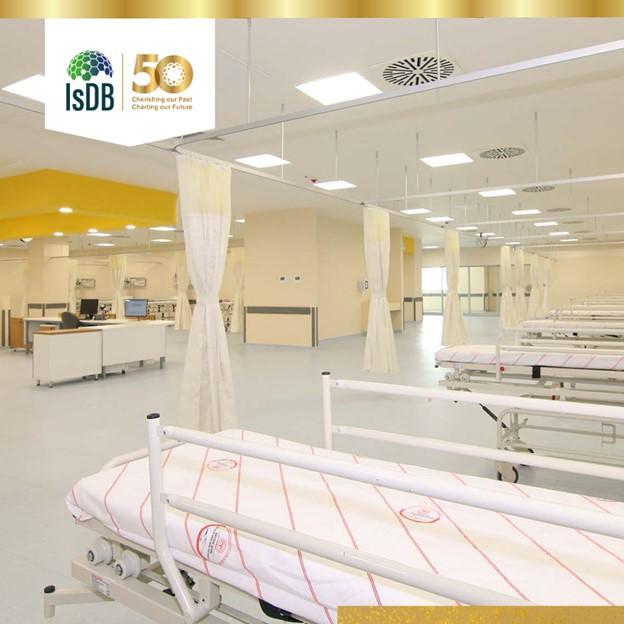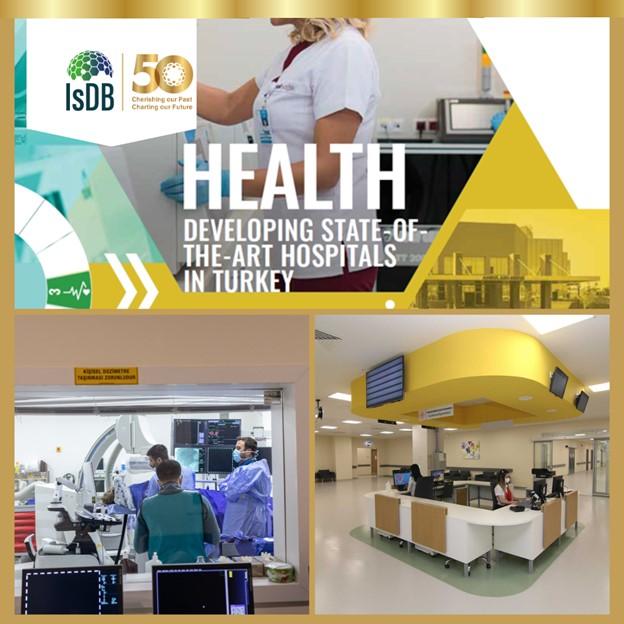Building a Healthier Future: The Konya City Hospital
Turkey, a relatively well-developed member country of the Islamic Development Bank (IsDB), has embarked on an ambitious journey towards universal health coverage (UHC). This commitment translates into state-of-the-art healthcare facilities like the Koya City Hospital aiming to significantly improve the health and well-being of its citizens.
The Challenge: A Dream Takes Shape
"We would like to crown the great transformation in the health sector with city hospitals," declared H.E. Dr. Fahrettin Koca, the Turkish Minister of Health. President Recep Tayyip Erdogan echoed this vision, calling these hospitals "my dream." This transformation is no exaggeration. Sweeping healthcare reforms have seen a dramatic rise in the number of people covered by universal health insurance. However, realizing this dream required substantial investments in infrastructure.
Turkey's challenge wasn't the ability to build high-quality hospitals; the country possessed the necessary capacity and skilled workforce. The hurdle lay in securing a viable financing model to support such large-scale projects. The Public-Private Partnership (PPP) model emerged as a promising solution, and the IsDB played a pivotal role in Konya City Hospital's success by pioneering Sharia-compliant financing for this project.
The Project: A Model for Collaboration

The overarching goal of the project was to expand access to high-quality healthcare by increasing hospital capacity. By supporting the PPP model, the IsDB facilitated the construction of Konya City Hospital, assisting Turkey in its long-term efforts to modernize its health infrastructure. The PPP model also offered broader benefits for efficiency and productivity beyond healthcare. Between 1986 and 2018, Turkey had implemented a staggering $139 billion worth of PPP projects across various sectors, and the government held high aspirations for replicating this model in the healthcare sector.
A critical aspect of the project involved arranging financing that aligned with the Turkish government's plan to develop integrated health campuses across the nation. These campuses aimed to add thousands of new beds to address Turkey's relatively low per capita bed capacity. Including Konya, ten campuses had opened by 2019, with another ten slated for completion by 2021.
The IsDB played a pioneering role by structuring the financing for the entire project, ensuring full Sharia compliance for the repayable portion of the total construction cost of KONYA CITY HOSPITAL. This innovative financing model garnered recognition, with the project being a finalist at the 2017 Bonds and Loans Awards, Turkey, in the categories of "Structured Financing of the Year" and "Infrastructure Finance of the Year."
The construction phase of Konya City Hospital saw a bustling worksite, with over 700 people employed for 24 months. Today, the hospital boasts a workforce exceeding 2,100 staff members. The building project sponsor continues to manage hospital operations, while the Ministry of Health covers both the long-term fixed asset costs and the healthcare services delivered within. This ensures thousands of new medical interventions every month, including roughly 2,000 surgical procedures.
The Results: A Vision Realized
Within its first ten months of operation, KONYA CITY HOSPITAL had already served over 1 million people. Operational data further reveals an impressive average occupancy rate exceeding 83% within the first year. This exceptional reach and patient uptake reflect the high-quality care provided by this well-equipped, modern facility. KONYA CITY HOSPITAL boasts 558 new general hospital beds, significantly boosting bed capacity in the region. The hospital's cutting-edge technology is further reflected in its exceptional performance on the Ministry of Health's Quality Standard for Health Audit, scoring a remarkable 96 points out of 100. This success, directly translating into better and more equitable healthcare for all, positions the PPP model as a financially sustainable solution.
Lessons Learned: A Model for Replication

The unique aspect of this project's success lies in its pioneering Sharia-compliant financing structure, spearheaded by the IsDB. The bank not only facilitated financing but also arranged the entire financial package, ensuring compliance with Islamic principles. Additionally, strong government support and ownership in creating an enabling environment for the PPP model were crucial factors in making the project bankable. This successful implementation paves the way for replicating the PPP model in other member countries.
Beyond its impact on creating a new hospital, the construction of KONYA CITY HOSPITAL offers valuable lessons for delivering socially and environmentally sustainable projects. The hospital was built on public land, ensuring it directly served the healthcare needs of a substantial local population. Detailed environmental and social responsibility assessments and independent audits revealed no negative impacts. In a nutshell, strong bankability, smooth implementation, and completion ahead of schedule are key takeaways from this new hospital's ...success story. The IsDB's role in the KONYA CITY HOSPITAL project extends beyond just financing. The bank's expertise in knowledge sharing and capacity building also played a vital role. Training programs were conducted for hospital staff on a variety of topics, including best practices in clinical care, hospital management, and sustainable operations. This knowledge transfer empowers the hospital to maintain its high standards of care and ensure its long-term success.
A Brighter Future: Building on Success
The Manisa Education and Research Hospital stands as a testament to the transformative power of collaboration. By combining the IsDB's financial expertise with Turkey's commitment to universal healthcare, the project has delivered tangible benefits for millions. The success of the KONYA CITY HOSPITAL project serves as a blueprint for future endeavors, demonstrating the effectiveness of Sharia-compliant financing and the PPP model in achieving ambitious development goals. Looking ahead, the lessons learned from KONYA CITY HOSPITAL can be applied to scale up similar projects across the IsDB's member countries, paving the way for a healthier future for all.